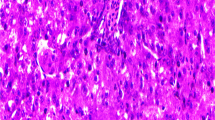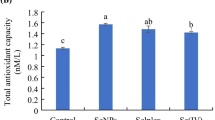Abstract
A 42-day comparative study was conducted to assess the impact of nanoselenium to other selenium sources on performance, antioxidant activity, immunity, and carcass traits in broilers. Ross 308 (n = 156) 1-day-old broiler chicks, with average initial body weight of 45.80 ± 0.35, were randomly allocated to 4 groups. The first group (G1) fed the basal diet without selenium supplementation. The second group (G2), the third group (G3), and the fourth group (G4) were supplemented with dietary selenium at the level of 0.3 mg kg−1 diet in the form of sodium selenite, seleno-methionine, and nanoselenium, respectively. The results revealed significant improvement on most of the performance parameters of nanoselenium at the level of 0.3 mg kg−1 diet (P < 0.05). Nanoselenium and seleno-methionine achieved the best dressing %, spleen index %, and thymus index %. Concerning to internal organ indices, none of these indices was significantly affected by any selenium sources (P < 0.05). Glutathione peroxidase (GSH-PX) activity and malondialdehyde (MDA) content were not significantly affected by different selenium sources among all experimental groups. Serum interleukin-6 (IL-6) and tumor necrosis factor-α (TNF-α) showed significant (P < 0.05) decrease in nanoselenium supplemented group compared with other groups. In case of serum IL-10 level, a significant (P < 0.05) increase was reported in nanoselenium supplemented group followed by G3 then G2. There were no statistical differences in the serum alanine transaminase, aspartate transaminase, total protein, albumin concentration, serum creatinine level, and uric acid concentration levels among all experimental groups. It is concluded that nano selenium can be a useful and better source of selenium for broilers.


Similar content being viewed by others
References
Ahmadi M, Ahmadian A, AR S (2018) Effect of different levels of Nano-selenium on performance, blood parameters, immunity and carcass characteristics of broiler chickens. Poult Sci J 6:99–108. https://doi.org/10.22069/psj.2018.13815.1276
Ao T, Paul M, Pescatore A, Macalintal L, Ford M,Dawson K (2019) Growth performance and bone characteristics of broiler chickens fed corn-soy diet supplemented with different levels of vitamin premix and sources of mineral premix. J App Anim Nutr 7. https://doi.org/10.1017/jan.2019.4
AOAC (2002) Official methods of analysis of the Association of Official Analytical Chemist. Arlington, VA.,
Attia Y, Abdalah A, Zeweil H, Bovera F, El-Din AT, Araft M (2010) Effect of inorganic or organic selenium supplementation on productive performance, egg quality and some physiological traits of dual-purpose breeding hens. Czech. J Anim Sci 55:505–519. https://doi.org/10.17221/1715-cjas
Aviagen (2017) Ross 308: broiler nutrition specification. Aviagen Inc, Huntsville http://en.aviagen.com/brands/ross/products/ross-308
Aviagen (2018) Ross 308 : Ross Broilers Management Handbook. Aviagen Inc, Huntsville http://eu.aviagen.com/assets/Tech_Center/Ross_Broiler/Ross-BroilerHandbook2018-EN.pdf
Awad A, Zaglool AW, Ahmed SA, Khalil SR (2019) Transcriptomic profile change, immunological response and disease resistance of Oreochromis niloticus fed with conventional and Nano-zinc oxide dietary supplements. Fish Shellfish Immunol 93:336–343. https://doi.org/10.1016/j.fsi.2019.07.067
Bhushan B (2017) Springer handbook of nanotechnology. Springer. https://doi.org/10.1007/978-3-540-29857-1
Cai S, Wu C, Gong L, Song T, Wu H, Zhang L (2012) Effects of nano-selenium on performance, meat quality, immune function, oxidation resistance, and tissue selenium content in broilers. Poult Sci J. 91:2532–2539. https://doi.org/10.3382/ps.2012-02160
Canoğullari S, Ayaşan T, Baylan M, Çopur G (2010) The effect of organic selenium on performance characteristics, egg production parameters and egg selenium content of laying Japanese quail. J FacVet Med, Kafkas University 16:743–749. https://doi.org/10.9775/kvfd.2009.1560
Chambers JM, Freeny AE,Heiberger RM (2017) Analysis of variance; designed experiments. In: Statistical models in S. Routledge, pp 145–193. https://doi.org/10.1201/9780203738535-5
Chen G, Wu J, Li C (2013) The effect of different selenium levels on production performance and biochemical parameters of broilers. Ital J Anim Sci 12:e79. https://doi.org/10.4081/ijas.2013.e79
Cholongitas E, Marelli L, Kerry A, Senzolo M, Goodier DW, Nair D, Thomas M, Patch D, Burroughs AK (2007) Different methods of creatinine measurement significantly affect MELD scores. Liver Transpl 13:523–529. https://doi.org/10.1002/lt.20994
Dlouhá G, Sevcikova S, Dokoupilova A, Zita L, Heindl J, Skrivan M (2008) Effect of dietary selenium sources on growth performance, breast muscle selenium, glutathione peroxidase activity and oxidative stability in broilers.Czech. J Anim Sci 53:265–269. https://doi.org/10.17221/361-cjas
Ghani MA, Barril C, Bedgood DR Jr, Prenzler PD (2017) Measurement of antioxidant activity with the thiobarbituric acid reactive substances assay. Food Chem 230:195–207. https://doi.org/10.1016/j.foodchem.2017.02.127
Gromer S, Eubel J, Lee B, Jacob J (2005) Human selenoproteins at a glance. Cell Mol Life Sci 62:2414–2437. https://doi.org/10.1007/s00018-005-5143-y
He Y, Fang J, Peng X, Cui H, Zuo Z, Deng J, Chen Z, Lai W, Shu G, Tang L (2014) Effects of sodium selenite on aflatoxin B 1-induced decrease of ileac T cell and the mRNA contents of IL-2, IL-6, and TNF-α in broilers. Biol Trace Elem Res 159:167–173. https://doi.org/10.1007/s12011-014-9999-2
Hosnedlova B, Kepinska M, Skalickova S, Fernandez C, Ruttkay-Nedecky B, Peng Q, Baron M, Melcova M, Opatrilova R, Zidkova J, Bjørklund G, Sochor J, Kizek R (2018) Nano-selenium and its nanomedicine applications: a critical review. Int J Nanomedicine 13:2107–2128. https://doi.org/10.2147/2FIJN.S157541
Hu C, Li Y, Xiong L, Zhang H, Song J, Xia M (2012) Comparative effects of nano elemental selenium and sodium selenite on selenium retention in broiler chickens. Anim Feed Sci Technol 177:204–210. https://doi.org/10.1016/j.anifeedsci.2012.08.010
Huang X-J, Choi Y-K, Im H-S, Yarimaga O, Yoon E, Kim H-S (2006) Aspartate aminotransferase (AST/GOT) and alanine aminotransferase (ALT/GPT) detection techniques. Sensors. 6:756–782. https://doi.org/10.3390/s6070756
Ip WE, Hoshi N, Shouval DS, Snapper S, Medzhitov R (2017) Anti-inflammatory effect of IL-10 mediated by metabolic reprogramming of macrophages. Science 356:513–519. https://doi.org/10.1126/science.aal3535
Khan (2008). Role of cytokines ,chapeter 2 immunopharmacology. Springer Science+Business Media, LLC 2008. https://www.doi.org/1007/978-0-387-77976-82
Kong H, Yang J, Zhang Y, Fang Y, Nishinari K, Phillips GO (2014) Synthesis and antioxidant properties of gum Arabic-stabilized selenium nanoparticles. Int J Biol Macromol. 65:155–162. https://doi.org/10.1016/j.ijbiomac.2014.01.011
Korzeniowska M, Madej JP, Stefaniak T, Kopec W (2019) Influence of selenium on the morphology of immune system organs in healthy broilers. Acta Veterinaria 69:379–390. https://doi.org/10.2478/acve-2019-0032
Kouzuma T, Usami T, Yamakoshi M, Takahashi M, Imamura S (2002) An enzymatic method for the measurement of glycated albumin in biological samples. Clin Chim Acta 324:61–71. https://doi.org/10.1016/s0009-8981(02)00207-3
Marković R, Glišić M, Bošković M, Baltić MŽ New scientific challenges–the possibilities of using selenium in poultry nutrition and impact on meat quality. In: IOP Conference Series: Earth and Environmental Science, 2017. vol 1. IOP Publishing, p 012032. https://doi.org/10.1088/1755-1315/85/1/012032
McClure S (2008) How minerals may influence the development and expression of immunity to endoparasites in livestock. Parasite Immunol 30:89–100. https://doi.org/10.1111/j.1365-3024.2007.00996.x
Mikulková K, Illek J, Bezděková Z, Šimková I (2019) Glutathione as an antioxidant marker: determination of glutathione concentration in the breast muscles and liver of broilers supplemented with different selenium sources. Acta Vet Brno 88:157–163. https://doi.org/10.2754/avb201988020157
Mousavi SN, Faghihi A, Motaghinejad M, Shiasi M, Imanparast F, Amiri HL, Shidfar F (2018) Zinc and selenium co-supplementation reduces some lipid peroxidation and angiogenesis markers in a rat model of NAFLD-fed high fat diet. Biol Trace Elem Res 181:288–295. https://doi.org/10.1007/s12011-017-1059-2
Navidshad B et al (2019) The new progresses in trace mineral requirements of broilers, a review. Iran J Appl Anim Sci 9:9–16
Oliveira T, Rivera D, Mesquita F, Braga H, Ramos E, Bertechini A (2014) Effect of different sources and levels of selenium on performance, meat quality, and tissue characteristics of broilers. J Appl Poult Res 23:15–22. https://doi.org/10.3382/japr.2013-00761
Ozkan S et al (2007) Dietary vitamin E (alpha-tocopherol acetate) and selenium supplementation from different sources: performance, ascites-related variables and antioxidant status in broilers reared at low and optimum temperatures. Br Poult Sci 48:580–593. https://doi.org/10.1080/00071660701593951
Payne RL, Southern LL (2005) Comparison of inorganic and organic selenium sources for broilers. Poult Sci 84:898–902. https://doi.org/10.1093/ps/84.6.898
Perić L, Milošević N, Žikić D, Kanački Z, Džinić N, Nollet L, Spring P (2009) Effect of selenium sources on performance and meat characteristics of broiler chickens. J Appl Poult Res. 18:403–409. https://doi.org/10.3382/japr.2008-00017
Raje K, Ojha S, Mishra A, Munde V, Rawat C, Chaudhary SK (2018) Impact of supplementation of mineral nano particles on growth performance and health status of animals: a review. J Entomol Zool Stud 6:1690–1694
Rao SV, Prakash B, Raju MV, Panda AK, Poonam S, Murthy OK (2013) Effect of supplementing organic selenium on performance, carcass traits, oxidative parameters and immune responses in commercial broiler chickens. Asian-australas. J Anim Sci 26:247–252. https://doi.org/10.5713/ajas.2012.12299
Ryu Y-C, Rhee M-S, Lee K-M, Kim B-C (2005) Effects of different levels of dietary supplemental selenium on performance, lipid oxidation, and color stability of broiler chicks. Poult Sci J. 84:809–815. https://doi.org/10.1093/ps/84.5.809
Saha U, Fayiga A, Hancock D, Sonon L (2016) Selenium in animal nutrition: deficiencies in soils and forages, requirements, supplementation and toxicity. Int J Appl Agric Sci 2:112–125. https://doi.org/10.11648/j.ijaas.20160206.15
Selim N, Radwan N, Youssef S, Eldin TS, Elwafa SA (2015a) Effect of inclusion inorganic, organic or nano selenium forms in broiler diets on: 1-growth performance, carcass and meat characteristics. Int J Poult Sci 14:135–143. https://doi.org/10.3923/ijps.2015.135.143
Selim N, Radwan N, Youssef S, Eldin TS, Elwafa SA (2015b) Effect of inclusion inorganic, organic or nano selenium forms in broiler diets on: 2-physiological, immunological and toxicity statuses of broiler chicks. Int J Poult Sci 14:144–155. https://doi.org/10.3923/ijps.2015.144.155
Ševčíková S, Skřivan M, Dlouhá G, Koucký M (2006) The effect of selenium source on the performance and meat quality of broiler chickens. Czech. J Anim Sci 51:449–457. https://doi.org/10.17221/3964-cjas
Shojadoost B, Kulkarni RR, Yitbarek A, Laursen A, Taha-Abdelaziz K, Negash Alkie T, Barjesteh N, Quinteiro-Filho WM, Smith TK, Sharif S (2019) Dietary selenium supplementation enhances antiviral immunity in chickens challenged with low pathogenic avian influenza virus subtype H9N2. Vet Immunol Immunop 207:62–68. https://doi.org/10.1016/j.vetimm.2018.12.002
Soetan K, Olaiya C, Oyewole O (2010) The importance of mineral elements for humans, domestic animals and plants-a review. African J of food Sci. 4:200–222 http://www.academicjournals.org/ajfs
Suttle NF (2010) Mineral nutrition of livestock. Cabi. https://doi.org/10.1079/9781845934729.0039
Ugar M, Tufan AN, Altun M, Guclu K, Ozyurek M (2018) Glutathione peroxidase activity of biological samples using a novel microplate-based method. Curr Anal Chem 14:512–518. https://doi.org/10.2174/1573411014666171204154653
Upton JR, Edens FW, Ferket PR (2008) Selenium yeast effect on broiler performance. Int J Poult Sci 7:798–805. https://doi.org/10.3923/ijps.2008.798.805
Wajant H, Pfizenmaier K, Scheurich P (2003) Tumor necrosis factor signaling. Cell Death & Differentiation 10:45–65. https://doi.org/10.1038/sj.cdd.4401189
Wang Y-B, Xu B-H (2008) Effect of different selenium source (sodium selenite and selenium yeast) on broiler chickens. Feed Sci Technol 144:306–331. https://doi.org/10.1016/j.anifeedsci.2007.10.012
Woods S et al (2020) Effect of feeding different sources of selenium on growth performance and antioxidant status of broilers. Br Poult Sci Just-Accepted:1–7. https://doi.org/10.1080/00071668.2020.1716301
Wrobel JK, Power R, Toborek M (2016) Biological activity of selenium: revisited. IUBMB Life 68:97–105. https://doi.org/10.1002/iub.1466
Yang Y et al (2012) Effect of organic and inorganic selenium supplementation on growth performance, meat quality and antioxidant property of broilers. Afr J Biotechnol 11:3031–3036. https://doi.org/10.5897/ajb11.3382
Yoon I, Werner TM, Butler JM (2007) Effect of source and concentration of selenium on growth performance and selenium retention in broiler chickens. Poult Sci 86:727–730. https://doi.org/10.1093/ps/86.4.727
Zheng K, Wu L, He Z, Yang B, Yang Y (2017) Measurement of the total protein in serum by biuret method with uncertainty evaluation. Measurement 112:16–21. https://doi.org/10.1016/j.measurement.2017.08.013
Author information
Authors and Affiliations
Corresponding author
Ethics declarations
The experiment was done in the Department of Nutrition and Clinical Nutrition, Faculty of Veterinary Medicine, Suez Canal University, Egypt. All experimental procedures were completed according to the strategies for the care and use of animals as established by Animal Welfare and Experimentation Ethics Committee, Faculty of Veterinary Medicine, Suez Canal University, Egypt [The approval No. 201603].
Conflict of interest
The authors declare that they have no conflict of interest.
Additional information
Responsible Editor: Mohamed M. Abdel-Daim
Publisher’s note
Springer Nature remains neutral with regard to jurisdictional claims in published maps and institutional affiliations.
Rights and permissions
About this article
Cite this article
Alian, H.A., Samy, H.M., Ibrahim, M.T. et al. Nanoselenium effect on growth performance, carcass traits, antioxidant activity, and immune status of broilers. Environ Sci Pollut Res 27, 38607–38616 (2020). https://doi.org/10.1007/s11356-020-09952-1
Received:
Accepted:
Published:
Issue Date:
DOI: https://doi.org/10.1007/s11356-020-09952-1




